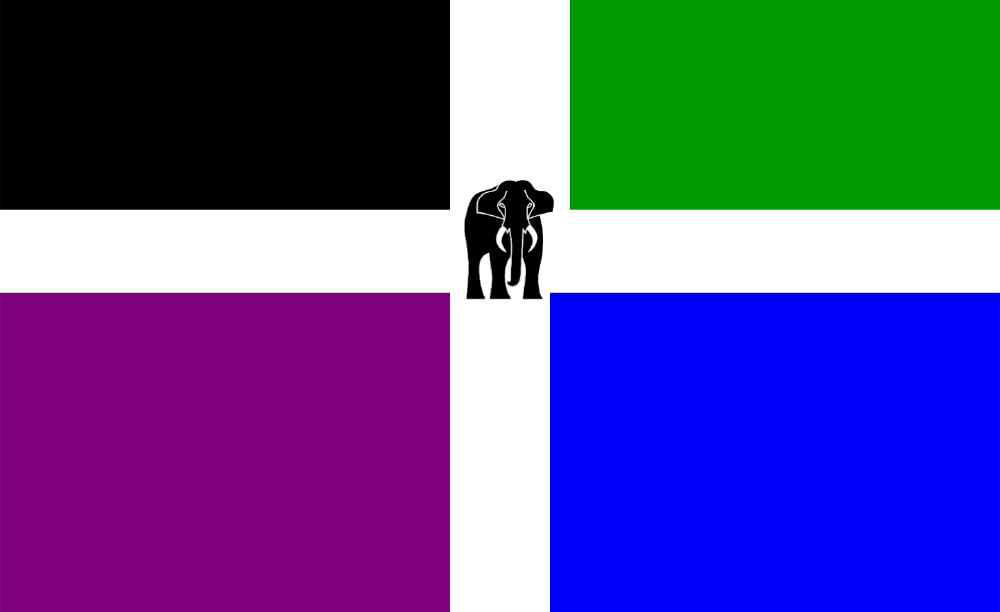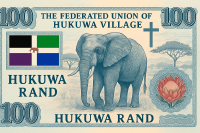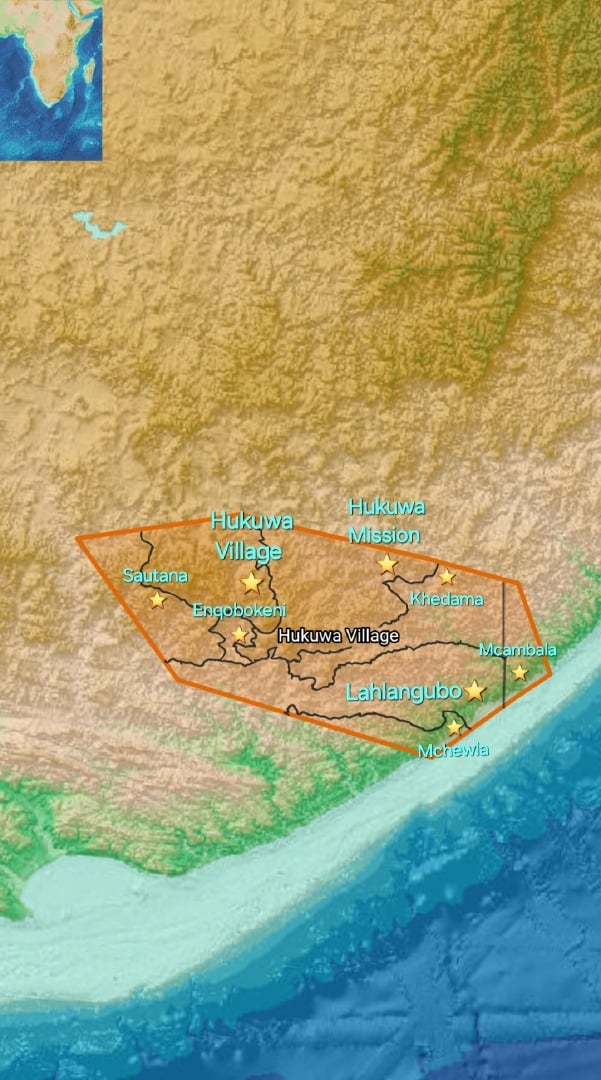| National Factbook |
| Flag: |

|
| Nation Name: |
Hukuwa Village |
| Leader Name: |
Emihle Sishuba |
| Currency: |

Hukuwa Rand |
| National Animal: |

Elephant |
| History: |
In South Africa’s Eastern Cape, there lies a small community that has quietly made history. The Federated States of Hukuwa Village, home to just 28,000 people and a few farms, officially became independent only six months ago. But this moment didn’t come out of nowhere—their journey toward self-rule began more than 40 years ago.
The Long Road to Freedom
Back in the early 1980s, the people of Hukuwa felt increasingly sidelined within the broader South African political scene. Their region, mostly rural and agricultural, was often ignored by government development plans and lacked even basic infrastructure. That’s when a local leader named Thabo Nkosana stepped forward. With quiet determination, he helped organize grassroots efforts focused on preserving local culture and building economic independence.
Thabo’s calm but steady leadership inspired many, even as they faced intimidation and crackdowns from authorities. Alongside him, Lindiwe Mabaso—a passionate teacher and advocate for women’s rights—played a crucial role in rallying support, especially among young people and farmers.
Though their movement remained under the radar during South Africa’s turbulent 1990s and early 2000s, it never lost momentum. Small victories, like gaining control over local farming policies and installing an oil-powered generator to bring electricity to the village, gave the people of Hukuwa a renewed sense of hope.
New Leadership, New Hope
The political shifts of the 2010s brought a new leader to the forefront: Emihle Sishuba. Born and raised in Hukuwa, Emihle grew up in the schools that Lindiwe Mabaso helped build and developed a deep connection to the community. With experience in local governance, Emihle was chosen as the Mongameli—a traditional title meaning “leader” or “king” in the local language—and became the face of the independence movement.
Balancing diplomacy with determination, Emihle led negotiations that eventually convinced regional authorities to recognize Hukuwa’s right to self-determination. Two years ago, the people voted overwhelmingly in favor of independence. And just six months ago, that vote became a reality.
A New Chapter
Today, the Federated States of Hukuwa Village is small but proud. Its economy revolves around five family farms that grow staple crops, while a single oil-powered generator provides much-needed electricity. President Mongameli Emihle Sishuba is focused on improving infrastructure, expanding education, and encouraging self-reliance.
Though still a young nation, the people of Hukuwa carry their history with humility and quiet strength. Their story is one of perseverance and community — proof that even the smallest places can forge their own path. |
| Geography |
| Continent: |
Africa |
| Land Area: |
27,600.18 sq. km |
| Terrain: |
The landscape of Hukuwa is predominantly mountainous, forming part of the Amatola Mountains. This region is known for its rugged topography, with steep slopes and deep valleys. The area is also part of the Cape Fold Belt, contributing to its complex geological features. The climate is temperate, with mild temperatures and moderate rainfall, supporting a variety of vegetation types. |
| Highest Peak: |
KwaRuka,
1,143 meters
|
| Lowest Valley: |
,
1,100 meters
|
| Climate: |
Overall, Hukuwa has a temperate mountain climate with warm, wet summers and cool, dry winters, typical of the Eastern Cape's interior highlands. This climate supports a mix of grassland and woodland vegetation and sustains intermittent streams that flow seasonally. |
| People & Society |
| Population: |
1,345,497 people |
| Demonym: |
umHukuwa |
| Demonym Plural: |
amaHukuwa |
| Ethnic Groups: |
amaXhosa - 99.0%
Other - 1.0%
Other - 0.0% |
| Languages: |
isiXhosa - 99.0%
English - 66.6%
isiZulu - 54.6% |
| Religions: |
Christianity - 77.5%
T.A.B(Traditional African Beliefs) - 18.6%
Other - 0.0% |
| Health |
| Life Expectancy: |
62 years |
| Obesity: |
21.6% |
| Alcohol Users: |
27.2% |
| Tobacco Users: |
22.3% |
| Cannabis Users: |
60.3% |
| Hard Drug Users: |
0.2% |
| Economy |
| Description: |
Economic Overview
Subsistence-Based Economy
Predominantly focused on meeting the basic needs of the population through agriculture and small-scale production
Most goods and services are produced for local consumption rather than export
Mixed Traditional and Emerging Market
Combination of traditional farming and craftsmanship alongside emerging small businesses and local trade
Limited industrialization due to constrained energy resources
Labor-Intensive and Low-Tech
Heavy reliance on manual labor and simple technologies
Small workshops and family-run enterprises dominate production
Localized Trade and Markets
Economic activity centered around local markets and community-based exchanges
Limited external trade, mainly involving nearby regions or neighboring nations
Government and Service Sector Support
Public services like healthcare, education, and administration form a stable economic base
Small-scale service industries grow slowly alongside primary industries
Energy-Constrained Development
Growth limited by reliance on a single oil-powered generator
Incentive for gradual investment in alternative energy and infrastructure to expand economic opportunities |
| Average Yearly Income: |
$77.22 |
| Gross Domestic Product (GDP): |
$1,708,755,145.00 |
| GDP per Capita: |
$1,269.98 |
| Gross National Income (GNI): |
$1,298,291,495.00 |
| Industries: |
Key Industries of the Nation
Agriculture & Agro-processing
Primary economic activity with 5 farms producing crops and livestock
Small-scale processing: grain milling, dairy products, fruit and vegetable preservation
Energy & Utilities
Electricity supplied by a single oil-powered generator
Essential services powered: government, healthcare, some residential areas
Maintenance and operation of power infrastructure
Basic Manufacturing & Craftsmanship
Carpentry, woodworking, and furniture making
Metalworking and tool repairs
Textile and leather goods production
Trade & Retail
Local markets and retail shops supplying goods and distributing farm produce
Small-scale transportation and logistics services
Services Sector
Healthcare and education institutions
Government administration and public services
Hospitality and food services
Construction & Infrastructure
Building and maintaining homes, farms, roads, and public buildings
Electrical infrastructure maintenance
Notes
Energy from the single generator limits industrial scale and operating hours
Industries remain low-tech and labor-intensive
Population supports primarily local consumption and small communities
Future growth potential through expanded agriculture and alternative energy sources |
| Military |
| History: |
|
| Soldiers: |
0 |
| Tanks: |
0 |
| Aircraft: |
0 |
| Ships: |
0 |
| Missiles: |
0 |
| Nuclear Weapons: |
0 |
| Last Updated: 06/22/2025 10:09 am |














